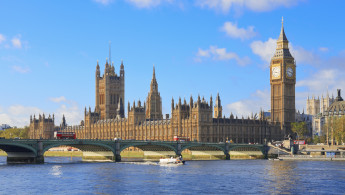UK's Conservative MPs raise concerns over Michael Gove's anti-BDS bill
A UK government bill aimed at preventing public bodies from carrying out boycotts of Israel has prompted concerns from lawmakers belonging to the ruling Conservative Party.
Communities Secretary Michael Gove's Economic Activity of Public Bodies (Overseas Matters) Bill, also known as the anti-boycott bill, was put forward on Monday.
Concerns about the proposed legislation have been raised with Gove by a group of backbenchers from his party.
While it is aimed at preventing the boycott and divestment efforts against Israel, it would also apply to public bodies carrying out their own campaigns against other foreign countries or territories.
Tory MPs have various concerns related to the proposed legislation, including the potential impact on boycotts of countries like China, British newspaper The Guardian reported on Saturday.
"I support the principle that taxpayers' money should not be politicised and should not be used to undermine the government's foreign policy," said Alicia Kearns, a Tory MP and the House of Commons foreign affairs select committee chair.
"My concern is we should not specifically name Israel on the face of the bill.
"We should not do country-specific legislation as it undermines our foreign policy. I also worry whether this will undermine community cohesion."
Nearly 10 MPs and members of the House of Lords, including Kearns, conveyed concerns regarding the bill before it goes back to parliament for the next stage in the legislative process, according to Conservative sources cited by The Guardian.
The bill was explicitly written so that while exceptions to the ban on boycotts could be made for other countries, this would not be the case for Israel, the occupied Palestinian territory, or the occupied Golan Heights.
The Golan is Syrian territory which Israel had illegally annexed.
"It is simply wrong that public bodies have been wasting taxpayers' time and money pursuing their own foreign policy agenda," Gove said in a Monday press release about his new anti-boycott bill.
"The UK must have a consistent approach to foreign policy, set by UK government," he said.
"These campaigns not only undermine the UK’s foreign policy but lead to appalling antisemitic rhetoric and abuse."
Ex-Tory party leader Iain Duncan Smith expressed concern that the proposed law could prevent government bodies from declining to purchase Chinese-produced goods.
"We have to make sure nothing gets in the way of stopping slave labour from Xinjiang being used in supply chains," he said, referring to a region where Uyghurs and other Muslim minority groups face grave rights abuses.
"The economic activity bill will ensure that the UK speaks with one voice internationally and the taxpayer only has to pay for foreign policy once," a British government spokesperson was quoted as saying by The Guardian.
"Public bodies should not be pursuing their own foreign policy agenda."
The bill has exemptions for boycotts of goods in cases where modern slavery is concerned, the spokesperson said.






 Follow the Middle East's top stories in English at The New Arab on Google News
Follow the Middle East's top stories in English at The New Arab on Google News


